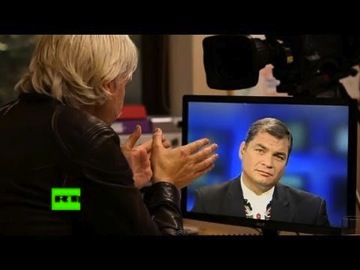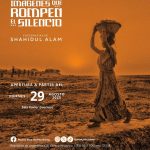by rahnuma ahmed

Instead of titling today’s column, “Ecuadorian military base in New York?” — I could easily have settled for something else. Because Rafael Correa, Ecuador’s charismatic president, spoke of many other equally important things in his recently given virtual interview to Wikileaks founder Julian Assange, for Russia Today TV (generally known as RT).
But I’ve chosen this over other ones, having been influenced partly by a recent report in an Indian TV channel which had claimed that the US wants to park its Seventh Fleet in the Bay of Bengal. May be, to even set up a naval base. The report, widely disseminated in the national media, was later hotly denied by both the Foreign Ministry, and the US Ambassador in Dhaka (see my last week’s column, “Indian chatter, 7th fleet in Bay of Bengal?,” New Age, June 4, 2012).
What Assange had asked Correa was, “Your government closed the US base at Manta. Can you tell me why…?” [3:35]
To which the president had replied, “Would you accept a foreign military base in your country, Julian?…[T]here is no problem in having a US military base in Ecuador but…only if they allow us to install an Ecuadorian base in the United States, a military base.”
Was it a perceived audacity that made Assange laugh? But Correa didn’t fail to respond to that either. “Are you having a lot of fun with the interview, Julian? I am glad to hear that. Me too.” [4:15]
(The interview can be watched at YouTube; a full unedited transcript of the interview with Spanish and English side-by-side is available at http://worldtomorrow.wikileaks.org/wp-content/uploads/2012/04/CORREA-FULL.pdf )
At the beginning of the interview, one can see Correa on screen waving his hand at Assange and saying, “Hi. Nice to meet you,” and then asking, “Where are you? In England?” [00:52]
“[Yes] under house arrest, for 500 hundred days.”
“Five hundred days?” An indescribable smile hovers around Correa’s lips as Assange adds (off-camera), “With no charge.”
“Okay,” a slight grimace. Nothing else. No oohs-aahs, oh, poor you! Okay, let’s start.
But he picks up the thread at the end of the interview when he tells Assange, “It has been a pleasure to meet you, Julian, at least through this means, and Cheer up! Cheer up! Welcome to the club of the persecuted!”
Assange responds, “Thank you, President Correa. And… yeah… bye bye, take care. Don’t get assassinated.”
Correa’s swift reply, “That?s what we are trying to do every day, to avoid that? ”
Not renewing the contract with the US over Manta, one of the largest military bases in Latin America, had come up in an earlier interview taken by Amy Goodman of Democracy Now! when the Ecuadorian president had visited New York in early 2008 to attend a UN conference. Correa had said, “I would renew it with one condition: that they allow me to set up an Ecuadorian military base here in New York. If there?s no problem with foreign bases, then let?s reach an agreement on that. I think that everybody listening is going to find that impossible. And for us Ecuadorians, it also seems impossible, based on our outlook informed by sovereignty, at least with the current government, to have a foreign military base on our soil.”
While campaigning in 2006, Correa had promised Ecuadorians that if elected, he would be willing to renew the 10-year contract (up for renewal in 2009), but only on the condition that the US allowed Ecuador to build, or station military on an air base in Miami, Florida. The US, not surprisingly (since all pigs are equal but some pigs are more equal than others), had rejected the idea. (Alternet, December 13, 2007).
But Correa’s refusal to renew the lease is not the only reason for US/western discontentment. To give an idea — both of the discontentment, and how Correa views it — one need only to turn to the UN conference, which Correa had gone to New York to attend: World Financial and Economic Crisis and Its Impact on Development. He was the only world leader there. The absence of many heads of state, according to Western diplomats, was because it was only a “platform to attack capitalism.” If so, said Correa, ?the attack was only well deserved. Surely western leaders who failed to attend the conference were ideologically biased for, if it had been an attack on socialism, they’d have been “delighted” to come.
What has occurred in recent decades worldwide, says Correa, is due to capitalism. It is “totally insane.” The workforce in Latin America has been treated as a “vulgar instrument for capital accumulation.” Exploitative mechanisms such as outsourcing and labour intermediation have been employed. Efforts have been made to destroy or minimise nation states, especially the economy, on the basis of reasons that are “closer to religion than science” — the market will solve all problems.
Latin Americans are the main victims of the “greatest crisis” since the 1930s, despite not having done anything to provoke it. The factors responsible are external to Latin America but integral to capitalism: exacerbated individualism, deregulation, competition. They have led to greater inequality, high unemployment and poverty. Obviously, “something has to change.”
Enjoying unprecedented popular support — according to WikiLeaked US embassy cables from Quito, “Correa is the first president since 1979 to enjoy sustained popularity in all regions of the country amongst the broad array of classes and demographic groups” — Correa has brought about changes, so fundamental, that he has been called a “transformative president” by some. An economist by training, with a PhD from the University of Illinois at Urbana-Champaign, Correa’s vision of acheiving a “brave, sovereign and dignified homeland, equitable, just and without misery”, secured through the drafting and passage of a new constitution for the country (2008), which has been termed a “citizens revolution” — has enabled him to focus on three major issues: oil policy, debt restructuring, and legal proceedings aimed at recovering assets from financial groups responsible for the crisis of 1999 (Jennifer Collins, Global Dialogue, 2008).
Instead of nationalising oil companies (crude oil is Ecuador’s biggest export contributing 35% of state revenues) Correa negotiated hard with transnational oil companies which produce 49% of Ecuador’s oil, significantly increased the government’s share of oil profits by increasing windfall-profits tax on these companies from 50% to 99% and, instead of using revenue earned from the tax hike to repay foreign debt, set it aside to build a “financial cushion” to protect Ecuador from a future drop in oil prices. To invest into productive sectors. Further, to prepare the country for “a post-petroleum economy.”
Declaring Ecuador’s foreign debt — 11 billion dollars — as being “illegitimate”, Correa endorsed the anti-debt NGO Jubilee’s 2000 slogan, “Life comes before debt.” This has meant paying the debt only after attending to the needs? of the poor. Only after having invested in health and education, infrastructure development and poverty alleviation. Correa’s defiance had led to renegotiating the debt repayment on terms favorable to Ecuador.
He also launched a creative initiative to resolve the debt burden by offering to forgo the government’s right to drill in the Yasuni National Park, a huge biodiverse Amazonian territory, home to Indians, also, the country’s largest oil reserve, in exchange for foreign aid and debt cancellation.
More recently, he has “kicked” out the US Ambassador after a WikiLeaks revelation which reported that the latter’s Ecuadorian contacts had said, the head of police was “completely corrupt” [5:57]. That, Correa had put him there “in order to control him.” But why did you kick her out? Wouldn’t it have been easier to say, “I know now how she thinks” — says Assange [5:45]. We called the Ambassador and asked for explanations, says Correa, but she replied with “extreme arrogance and prepotence, imperial characteristics.” She had nothing to explain, she said. And since “we respect our country, we expelled this lady.”
Ecuador has also thrown out US diplomat Armando Astorga because he was “insolent” and “foolish,” and treated Ecuador like a “colony.” The seeds of the Astorga story lie in the US having provided money for certain Ecuadorian police units, these included intelligence units, both police and military. The money was not unconditional or spontaneous, said Correa, the US Embassy would choose the directors of those units, would have them take lie-detector tests at the Embassy. Since those units “answered more to the US Embassy than the Ecuadorian state”, the Correa government, as an exercise in sovereignty, had wanted to change one of the unit’s directors. At this, Astorga had written a letter to say that Ecuador would have to return everything which the US had given them, computers, automobiles etc. Ecuador did, including Mr Astorga.
In the Assange interview, Correa also talks about a near-coup by the police in September 2010 which could have threatened the latter’s life [2:00]. He also talks about the Ecuadorian media, which, he insists on putting the record straight, is dedicated to defending private interests [11.15]. “Good faith journalists”, “angelical ones persecuted by malevolent governments” are “myths”, says Correa. Media power in Ecuador (as in most of Latin America) is greater than political power; media power actually functions to defend the economic, social and informational power of large corporations and banks. When I became president there were seven national television channels, five owned by banks, no public service television, which meant that if I wanted to move against the banks, they would immediately launch “a merciless campaign against our measures in order to defend the interests of the bankers who were the owners of this media.”
For us Bangladeshis, much food for thought, no?
Watching the interview was a real treat for Correa is very witty as well. The difference between what I think in the morning and what I think in the afternoon is far greater than the thoughts that divide Republicans from Democrats. Another line, although a quote from Evo Morales, president of Bolivia, is worth telling: the only country sure to never have a coup d’etat is the United States because it hasn’t got a US embassy! [1:42]
Published in New Age on Monday June 11, 2012





Leave a Reply
You must be logged in to post a comment.